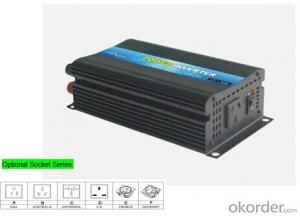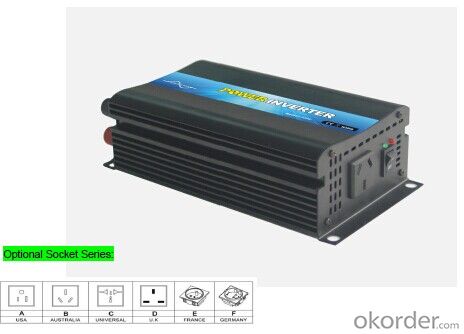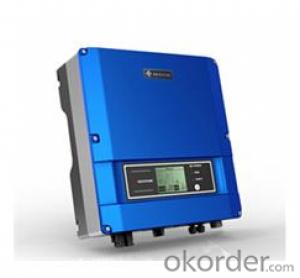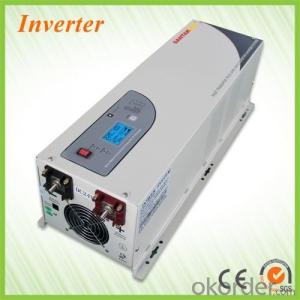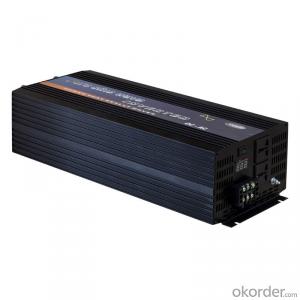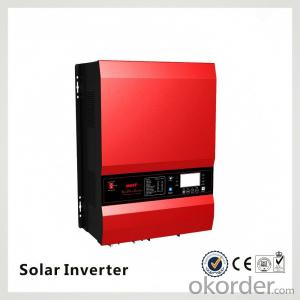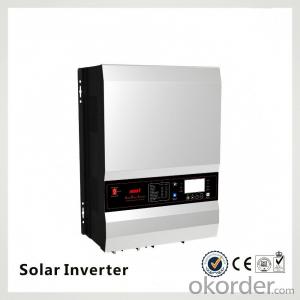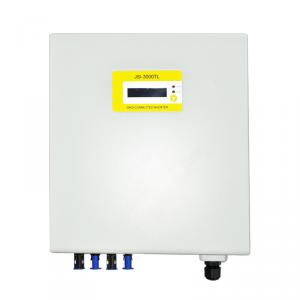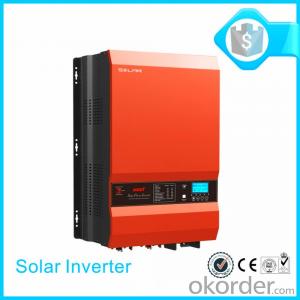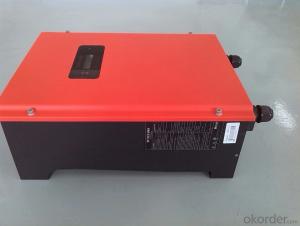Opti Solar Inverter 6000W Off-Grid Solar Inverter
- Loading Port:
- China Main Port
- Payment Terms:
- TT OR LC
- Min Order Qty:
- -
- Supply Capability:
- -
OKorder Service Pledge
OKorder Financial Service
You Might Also Like
Features
Pure sine wave output (THD<3%)
Power ON-OFF switch
Input voltage range:-20% ~ +30%
Output voltage regulation:±10%
Thermo control cooling fan
Two-color indicators display power and fault status
Protections:short circuit, overload, over temperature,
Low battery voltage, over battery voltage, lack-voltage alarm.
Topology: Pull-push
Approvals: CE mark / EMC / LVD/ RoHS
1 year warranty
(Remarks: Customizable input voltage such as 36v, 72v, 96v,110v;output voltage such as 120v, 130v, 200v,240v, etc; )
Order model No | P300w-12A | P3000w-24A | P300w-48A | P300w-12B | P3000w-24B | P300W-48B | ||||||
Output | AC voltage | 110V±10% | 220V±10% | |||||||||
Rated power | 6000W | 6000W | ||||||||||
Peak power | 12000W | 12000W | ||||||||||
Waveform (THD) | Pure sine wave (<3%) | Pure sine wave (<3%) | ||||||||||
Frequency | 60Hz ±0.3% or 50Hz ±0.3% | |||||||||||
Input | NO load current draw | <2.7A | <1.95A | <1.6A | <2.7A | <1.95A | <1.6A | |||||
DC voltage | 12V | 24V | 48V | 12V | 24V | 48V | ||||||
DC Voltage range | 9.5~16V | 19~32V | 38~63V | 9.5~16V | 19~32V | 38~63V | ||||||
Efficiency | > 8 6 % | > 8 8 % | > 90% | > 8 6 % | > 8 8 % | > 9 0 % | ||||||
DC connector | Cables With Clips or Car Adaptor | Cables With Clips or Car Adaptor | ||||||||||
Protection | DCLow voltage alarm | 10.3~10.6V | 20.6V ~21.2V | 41.2V~42.4V | 10.3~10.6V | 20.6V ~21.2V | 41.2V~42.4V | |||||
DC Low voltage shut down | 9.4~9.6V | 18.8~19.2V | 37.6~38.4V | 9.4~9.6V | 18.8~19.2V | 37.6~38.4V | ||||||
Over load | Shut Off Output | Shut Off Output | ||||||||||
DC Over voltage shut down | 15.8~16.2V | 30~32V | 60~63V | 15.8~16.2V | 30~32V | 60~63V | ||||||
Over thermal | Shut Off Output Automatically | Shut Off Output Automatically | ||||||||||
Fuses | Short Circuit | Short Circuit | ||||||||||
Environment | Working temperature | -10°c ~ +50°c | -10°c ~ +50°c | |||||||||
Working humidity | 10%~90%RH | 10%~90%RH | ||||||||||
Storage temperature | -20°c ~ +50°c | -20°c ~ +50°c | ||||||||||
Work altitude | ≤1000m | |||||||||||
Package | Machine Size(mm) | 545*199*146 | 545*199*146 | |||||||||
Packing Size(mm) | 620*270*215 | 620*270*215 | ||||||||||
Net Weight | 12.1kg/unit | 12.1kg/unit | ||||||||||
Gross Weight | 14.7kg/unit | 14.7kg/unit | ||||||||||
Packing Mode | Carton | Carton | ||||||||||
Other | Star | Soft Star | Soft Start | |||||||||
Cooling Ways | Cooling Fan | Cooling Fan | ||||||||||
- Q: How does a solar inverter handle voltage regulation in the grid?
- A solar inverter regulates voltage in the grid by converting the DC power generated by the solar panels into AC power that matches the voltage and frequency of the grid. It monitors the grid's voltage level and adjusts the output accordingly to ensure a stable and consistent supply of power. Additionally, it also helps in maintaining power quality by maintaining the grid's voltage within the specified range and compensating for fluctuations or variations in voltage levels.
- Q: Can a solar inverter be integrated with energy management systems?
- Yes, a solar inverter can be integrated with energy management systems. In fact, many modern solar inverters are designed to be compatible with energy management systems, allowing for better monitoring, control, and optimization of the energy generated by the solar panels. This integration enables users to track their energy production, consumption, and storage, and make informed decisions on energy usage to maximize efficiency and cost savings.
- Q: The function of photovoltaic grid - connected inverter
- In general, single-phase h-bridge is a common configuration of dc / ac-level, but can also be used in three-phase and other configurations.
- Q: What is the role of a solar inverter in voltage support?
- The role of a solar inverter in voltage support is to convert the direct current (DC) power generated by solar panels into alternating current (AC) power that can be used to support the voltage requirements of electrical devices and the overall electrical grid. The inverter ensures that the AC power produced by solar panels matches the voltage and frequency requirements of the electrical system, thereby providing stable and reliable power supply.
- Q: Can a solar inverter be used with different tracking algorithms?
- Yes, a solar inverter can be used with different tracking algorithms. Inverters are designed to convert the DC power generated by solar panels into AC power for use in homes and businesses. They typically have the ability to integrate with various tracking algorithms that optimize solar panel performance by adjusting their position and angle according to the sun's movement. This flexibility allows for increased energy production and efficiency based on the specific tracking algorithm used.
- Q: Grid-connected inverter is generally divided into photovoltaic power generation grid-connected inverter, wind power grid-connected inverter, power equipment and grid-connected inverter and other power generation equipment power generation inverter.
- Grid-connected inverter is generally used with large-scale photovoltaic power plant system, a lot of parallel PV string is connected to the same set of inverter DC input, the general power of the use of three-phase IGBT power module, power
- Q: Can a solar inverter be used in systems with different module strings?
- Yes, a solar inverter can be used in systems with different module strings. Solar inverters are designed to be compatible with a wide range of module string configurations, allowing for flexibility in system design and installation. The inverter's maximum input voltage and power ratings should be considered to ensure compatibility with the different module strings, but as long as these specifications are within the inverter's limits, it can effectively convert the DC power generated by the module strings into AC power for use in the system.
- Q: What is the role of a fault detection system in a solar inverter?
- The role of a fault detection system in a solar inverter is to monitor the performance and health of the inverter and solar panels, and to detect any faults or abnormalities that may occur during operation. It helps to identify issues such as short circuits, voltage fluctuations, overheating, or component failures, which can affect the efficiency and safety of the solar power system. By quickly identifying and alerting the user or system operator about these faults, the fault detection system allows for timely maintenance or repair, ensuring optimal performance and longevity of the solar inverter.
- Q: What is the role of a solar inverter in fault ride-through capability?
- The role of a solar inverter in fault ride-through capability is to ensure that the solar power system remains operational and stable during grid faults or disturbances. The inverter is responsible for detecting fault conditions and adjusting its output to mitigate the impact of the fault on the system. By providing fault ride-through capability, the solar inverter helps maintain grid stability and ensures continuous power supply from the solar panels even in the presence of faults.
- Q: Are there any safety considerations when installing a solar inverter?
- Yes, there are several safety considerations when installing a solar inverter. Firstly, it is important to ensure that the installation is done by a qualified professional who has the necessary knowledge and expertise. Additionally, proper grounding and electrical connections should be established to minimize the risk of electric shocks or fires. Adequate ventilation and protection from moisture should also be provided to prevent overheating and damage. Lastly, it is crucial to follow all manufacturer's instructions and local building codes to ensure a safe and compliant installation.
Send your message to us
Opti Solar Inverter 6000W Off-Grid Solar Inverter
- Loading Port:
- China Main Port
- Payment Terms:
- TT OR LC
- Min Order Qty:
- -
- Supply Capability:
- -
OKorder Service Pledge
OKorder Financial Service
Similar products
Hot products
Hot Searches
Related keywords
